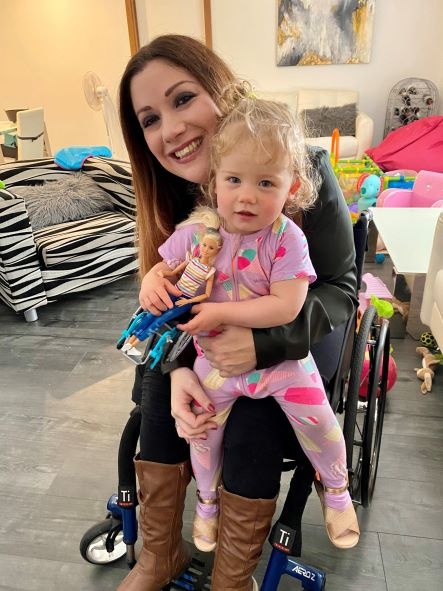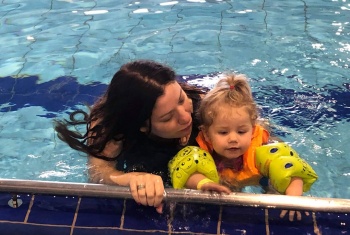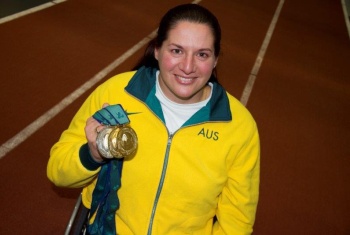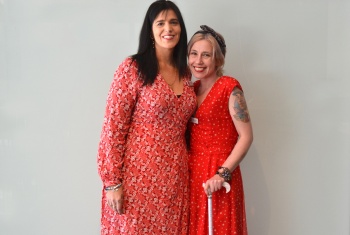People have often made the mistake of underestimating Krystal Matthews.
Born with cerebral palsy, Krystal and her family saw no limits for her. But others did.
In high school, a teacher urged Krystal, who uses a wheelchair, not to take part in a childcare activity because she ‘would never become a mother’.
In the workplace, with a degree in Social Work under her belt, Krystal found employers reluctant to take her on.
“I’ve had to deal with a lot of people who had preconceived notions of who I was and what I was capable of, purely on the basis that I was in a wheelchair,” Krystal says.
“In 2010, I went for an interview for my dream job. And as I rolled into the door for the interview, I was told 5 different reasons why they weren’t going to employ me. And none of those things was based on my experience or my qualifications. It was really disheartening.”
But Krystal hasn’t let other people’s low expectations slow her down.
With support from the National Disability Insurance Scheme (NDIS), both at work and at home, Krystal is thriving in her chosen profession while balancing the demands of full-time work, parenting, and having a disability.
After a decade working as a social worker with Housing SA, Krystal, 37, recently moved into the leadership role of South Australia State Manager for not-for-profit Specialist Disability Accommodation (SDA) provider, DEC Housing (DEC).
“I've had a lot of experience in public housing, and I've seen the housing gaps that are out there. I also have my own lived experience. This means I understand the issues that impact people with disabilities in the housing market and what they need,” Krystal says.
Krystal says DEC is dedicated to helping people with disability (and others facing insecure housing) to live in custom-built accommodation that empowers independence.
“I'm really excited to be the State Manager of this housing organisation. It’s a non-profit organisation that is closely aligned with my personal belief that participants should have more control and input into their housing,” she says.
Krystal is among 97% of participants who said they felt happy with their relationships with staff who work with them, an increase of over a third.
“We talk a lot within the NDIS system about choice and control, but from a practical perspective, that’s not what we see in the housing market.
“What we often see is a one-size-fits-all concept and then a participant is living in the property. But it's not necessarily facilitating their level of independence or their own specific disability requirements.
“With the DEC Housing model, it provides participants with the opportunity to operate within a housing market in the same way that non-disabled people do.
“So, they get the choice to pick the area or region where they live, and to work with architects in designing the layout of the property that will meet their needs and maximise their independence.
“The DEC Housing model also allows people to contribute financially to their home if they want to. There’s a home-ownership structure they can be part of if they choose, which is something people with disabilities want to be part of, just like any other person.”
In addition to her new management role, Krystal is also SA Associate Director for national people with disability advocacy body, Physical Disability Australia, and advocates for a more inclusive society.
Krystal works full time and is a busy mum to daughters, 3-year-old Zara and 14-year-old Natalie.
Krystal says she couldn’t manage all her roles without the support of the NDIS.
“I don’t think I would have been able to progress into a leadership role without the support of the NDIS,” she says.
“Sometimes, when you become a mum you feel you have to pick one or the other. And when you have a disability, that can take up a lot of time too.
This family support outcome is evidence of a three-fold increase in families and carers who agree the NDIS has helped them to better care for their family member over five years in the Scheme.
“I’m a manager of a housing organisation, I’m a mum who has a private life and a social life, and I’m a disabled person. It takes a lot of work, so it would be very hard without that support.”
Krystal is one of many participants who have discovered the NDIS is helping them have the independence to make more decisions in their lives. For participants aged over 15, 69% say the NDIS is giving them more choice and control.
Krystal’s NDIS plan includes funding for transport to and from work, and physical and occupational therapies, which help keep her healthy. She also has support workers who help her with daily tasks at home to live independently.
“I want to be a role model to my daughters. It’s important they see me working hard and not giving up. Sometimes I’m tired and a bit overwhelmed but I just take it day by day,” she says.



